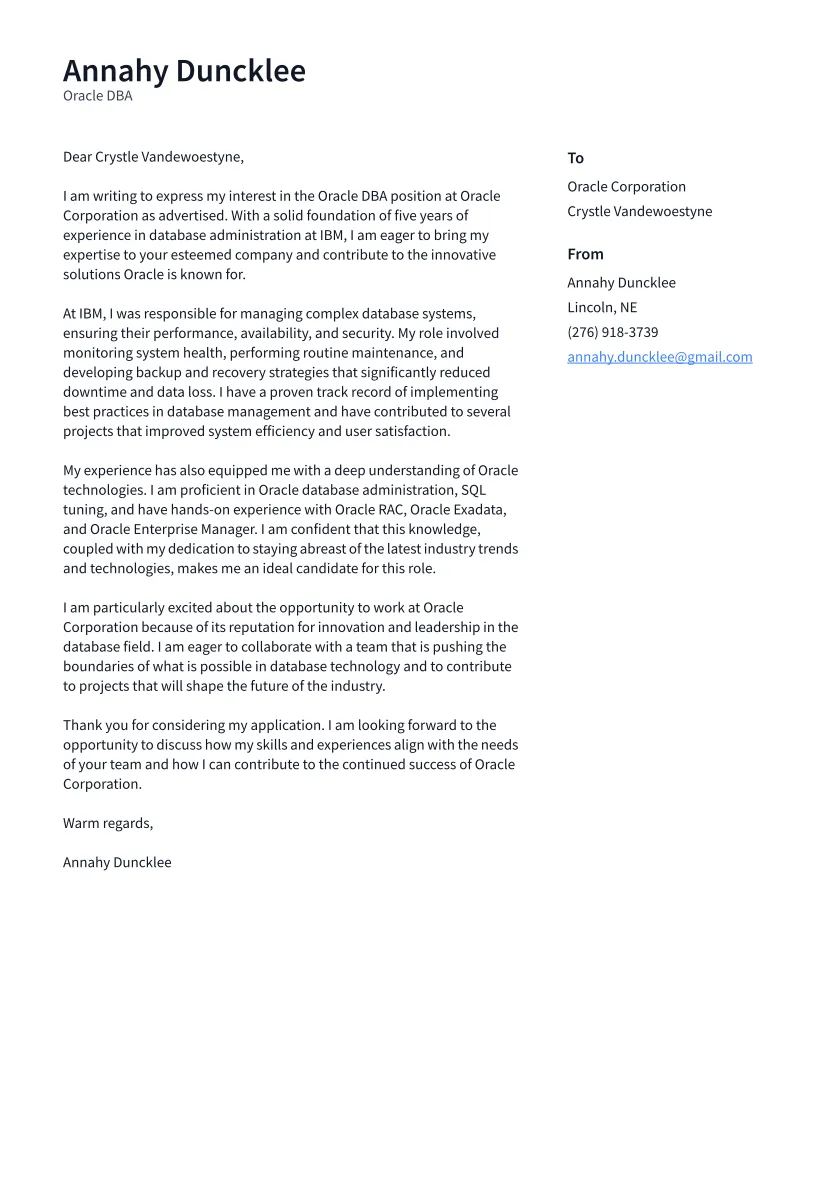Crafting Your Oracle DBA Cover Letter
Your Oracle DBA cover letter is your first impression on a potential employer, and it’s crucial to make it count. It’s not just a formality; it’s a critical tool for showcasing your skills, experience, and enthusiasm for the role. A well-crafted cover letter complements your resume, providing a narrative that highlights your key accomplishments and demonstrates how you align with the specific requirements of the job. Think of it as your personal sales pitch, designed to convince the hiring manager that you are the perfect fit for the position. The objective is to make your cover letter stand out from the competition, compelling the reader to learn more about your qualifications.
Highlighting Your Oracle DBA Skills
The core of your cover letter should revolve around highlighting your most relevant skills. Oracle DBA roles demand a diverse skill set, so tailoring your cover letter to emphasize the skills mentioned in the job description is key. Consider the specific technologies and responsibilities outlined in the job posting. Focus on the skills where you have significant experience. Avoid generic statements. Instead, provide specific examples that illustrate your proficiency. For example, rather than stating you have ’experience with database management,’ describe a project where you successfully managed a large database, optimized performance, or implemented security measures. This approach will set you apart and demonstrate a clear understanding of the job’s requirements.
Technical Expertise
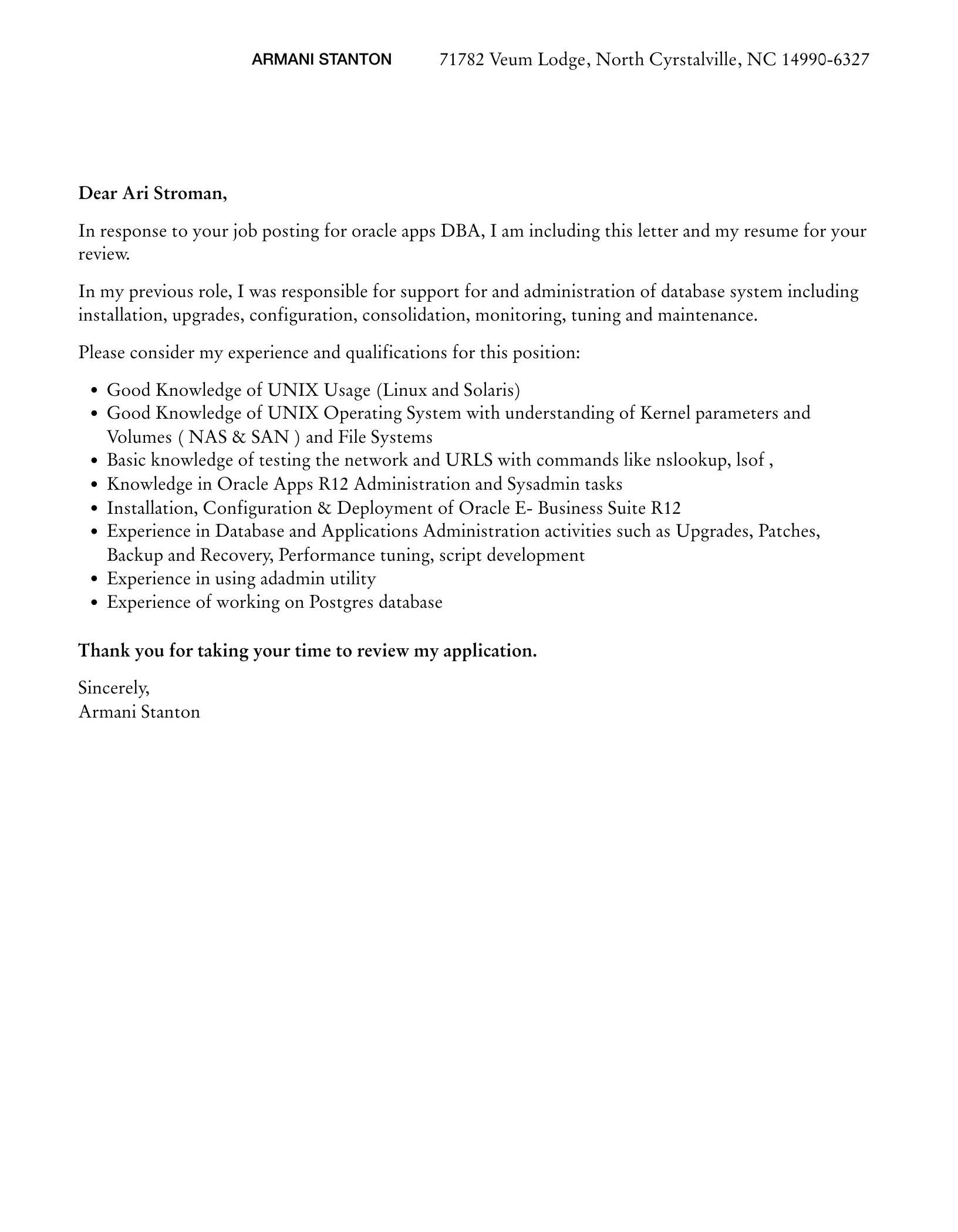
Technical expertise is paramount for an Oracle DBA. Highlight your proficiency in Oracle database administration, including installation, configuration, and maintenance. Detail your experience with database design, performance tuning, backup and recovery strategies, and security implementations. Mention specific Oracle versions you’ve worked with, along with any relevant certifications, such as Oracle Certified Professional (OCP). Discuss your familiarity with SQL, PL/SQL, and other relevant scripting languages. If you have experience with cloud-based Oracle solutions (e.g., Oracle Cloud Infrastructure), make sure to include that information. The aim is to demonstrate that you possess the essential technical skills to manage and maintain an Oracle database environment effectively.
Database Administration
Database administration involves a wide array of responsibilities, so it’s important to showcase your comprehensive experience. Detail your knowledge of user management, database security, and data integrity. Mention any experience with database monitoring tools, such as Oracle Enterprise Manager or third-party solutions. Highlight your ability to troubleshoot and resolve database issues, ensuring optimal performance and availability. Describe your experience in developing and implementing database policies and procedures. Include any experience in capacity planning, performance monitoring, and system optimization. The goal is to demonstrate your ability to handle the day-to-day tasks of database administration while also planning for the long-term health of the database environment.
Performance Tuning
Performance tuning is a crucial skill for Oracle DBAs, essential for ensuring databases run efficiently. Provide specific examples of your performance tuning experience, such as identifying and resolving bottlenecks, optimizing SQL queries, and implementing indexing strategies. Mention your experience using Oracle’s diagnostic tools to analyze performance metrics and identify areas for improvement. Detail any experience with AWR reports, ASH reports, or other performance analysis tools. Describe how you’ve optimized database parameters, such as memory allocation and I/O configuration. Quantify your achievements whenever possible; for instance, state how you improved query response times or reduced resource utilization. Focus on demonstrating your ability to proactively improve database performance.
Problem-Solving Abilities
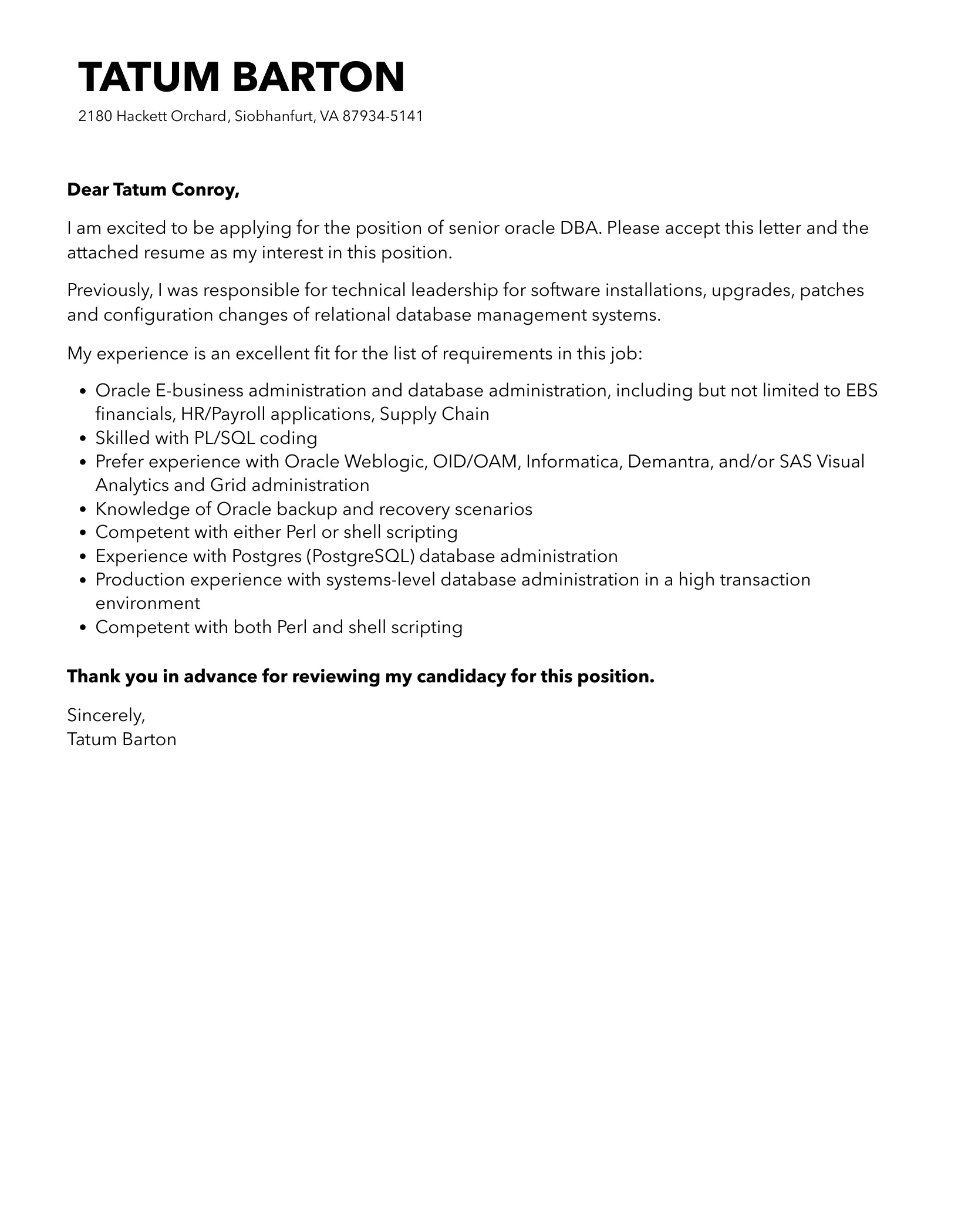
Problem-solving is a core competency for DBAs, and highlighting this will demonstrate your ability to handle complex issues. Describe instances where you successfully resolved database problems, such as data corruption, performance degradation, or security breaches. Detail the steps you took to diagnose the issue, the tools and techniques you used, and the outcome of your actions. Emphasize your analytical skills and your ability to think critically under pressure. Showcase your capacity to work independently and as part of a team to resolve critical issues. Provide clear examples of how you identified and corrected the root causes of database problems, thus improving stability and preventing future issues. Your ability to resolve complex issues is crucial.
Tailoring Your Cover Letter
A generic cover letter won’t cut it. Tailoring your letter to each job is essential for showing you have done your research and that you understand the specific needs of the role. Read the job description carefully and identify the key requirements, skills, and qualifications. Then, highlight your relevant experience and skills in a way that directly addresses those requirements. Use the same keywords and phrases from the job description in your cover letter, and be sure to customize your letter to reflect the company’s culture and values. This level of personalization shows that you’re genuinely interested in the position and have taken the time to understand the company.
Understanding the Job Description
Before you start writing, thoroughly analyze the job description. Identify the essential skills, experience, and qualifications the employer is seeking. Pay close attention to the specific technologies and responsibilities mentioned. Make a list of the keywords and phrases used in the job description, as these indicate the language the employer uses to describe the ideal candidate. Use this information to structure your cover letter, ensuring you address each requirement and highlight your relevant experience. By understanding the job description, you can demonstrate to the hiring manager that you meet their specific needs and possess the necessary qualifications.
Quantifying Your Achievements
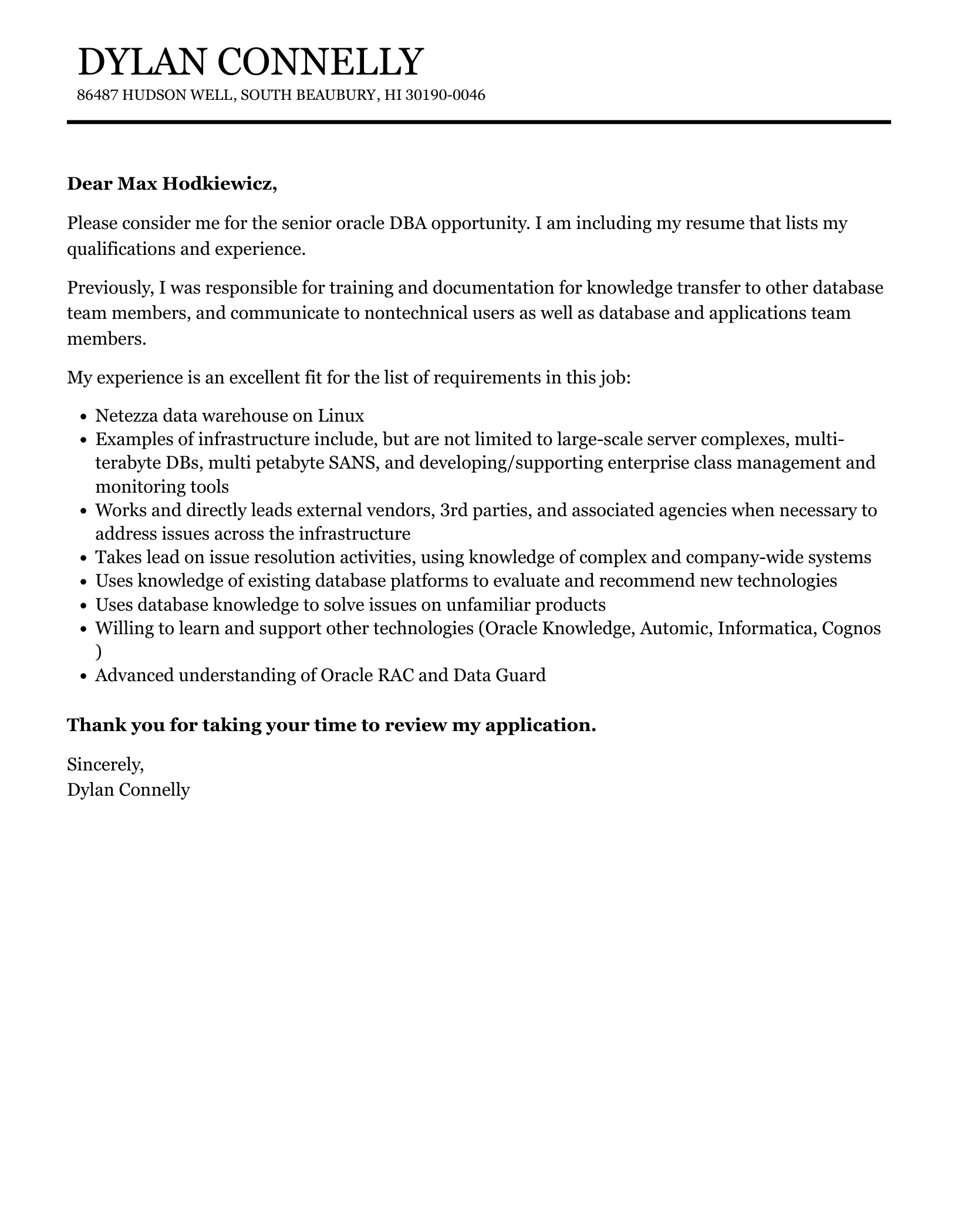
Instead of simply stating that you have experience with a certain technology, provide specific examples of your accomplishments. Use numbers and data to quantify your achievements. For instance, state how you improved database performance by a certain percentage, reduced downtime, or saved costs. Whenever possible, use metrics to illustrate the impact of your work. For example, state, ‘Improved query performance by 30% by optimizing SQL queries,’ or ‘Reduced database downtime by 20% through proactive monitoring and maintenance.’ Quantifying your achievements adds credibility to your claims and demonstrates the value you can bring to the role. It shows a tangible outcome from your actions.
Showcasing Relevant Experience
Choose the most relevant experiences to highlight in your cover letter. Focus on projects and roles that demonstrate your skills in Oracle database administration. Describe your key responsibilities, the technologies you used, and the outcomes of your work. If you have experience in specific industries or environments, such as healthcare or finance, be sure to mention them if they are relevant to the job. Tailor your examples to align with the job description. If the job emphasizes a particular area of expertise, such as database security, ensure you provide relevant examples of your experience in this area. The goal is to show the hiring manager that you have the specific knowledge and skills to excel in the role.
Oracle Database Experience
Your experience with Oracle databases should be a prominent focus. Detail the versions of Oracle you’ve worked with, the types of databases you’ve managed (e.g., OLTP, OLAP), and the tools you are proficient in. Highlight any experience with Oracle Cloud Infrastructure (OCI) or other cloud-based Oracle solutions, if applicable. Describe your experience in database design, including schema creation, data modeling, and optimization. Explain your experience with Oracle’s features, such as RAC, Data Guard, and partitioning. Be specific about your contributions to database performance, security, and availability. Show your proficiency in key areas like database security, backup, and recovery strategies. The goal is to demonstrate your comprehensive understanding of the Oracle database ecosystem.
Backup and Recovery Experience
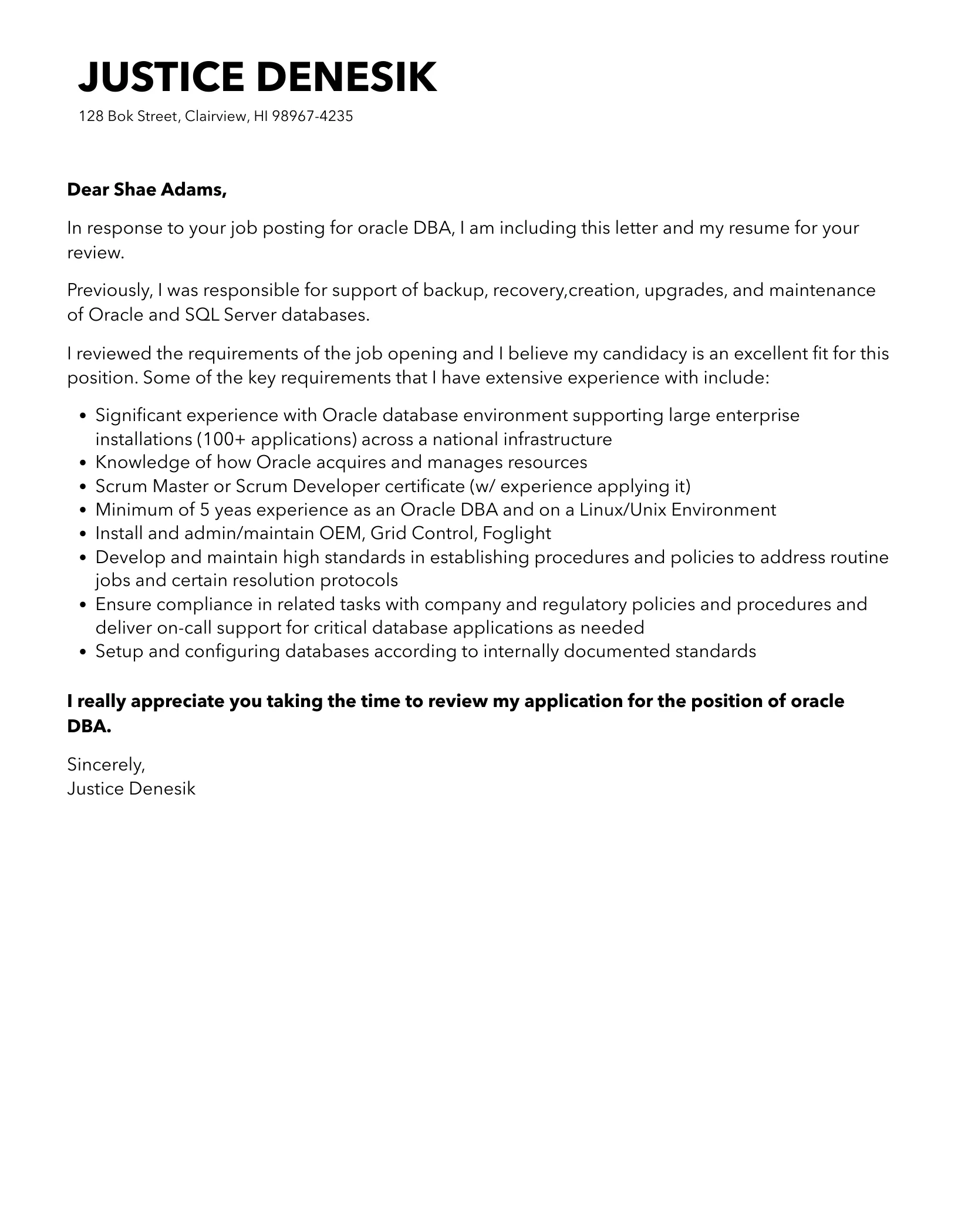
Demonstrating your expertise in backup and recovery is crucial. Detail your experience with different backup strategies (e.g., RMAN, hot backups, cold backups) and your ability to implement and test these strategies. Mention any experience in disaster recovery planning and implementation. Describe your experience in performing database restores and ensuring data integrity. Explain how you’ve used backup and recovery to meet business requirements for data availability and business continuity. Detail any automation you’ve implemented for backup and recovery processes. The hiring manager needs to be assured of your ability to protect the data.
Why This Role is for You
In the closing section of your cover letter, explain why you are interested in the specific role and the company. Research the company and show that you understand their business, their mission, and their values. Explain how your skills and experience align with the company’s needs and how you can contribute to their success. Show that you are enthusiastic about the opportunity and excited about the prospect of joining their team. Tailor this section to the specific company and role, demonstrating that you have a genuine interest in working there. It shows the hiring manager that you’re not just sending out generic applications.
Expressing Enthusiasm and Interest
End your cover letter with a strong expression of enthusiasm and interest. Reiterate your interest in the position and the company. Mention your desire to learn more about the opportunity and your eagerness to contribute to their success. Make it clear that you are available for an interview and look forward to discussing your qualifications further. Close your cover letter with a professional closing, such as ‘Sincerely’ or ‘Best regards,’ followed by your name. It’s important to leave a positive and memorable impression and a call to action. By expressing your enthusiasm and interest, you signal to the hiring manager that you are serious about the opportunity.
